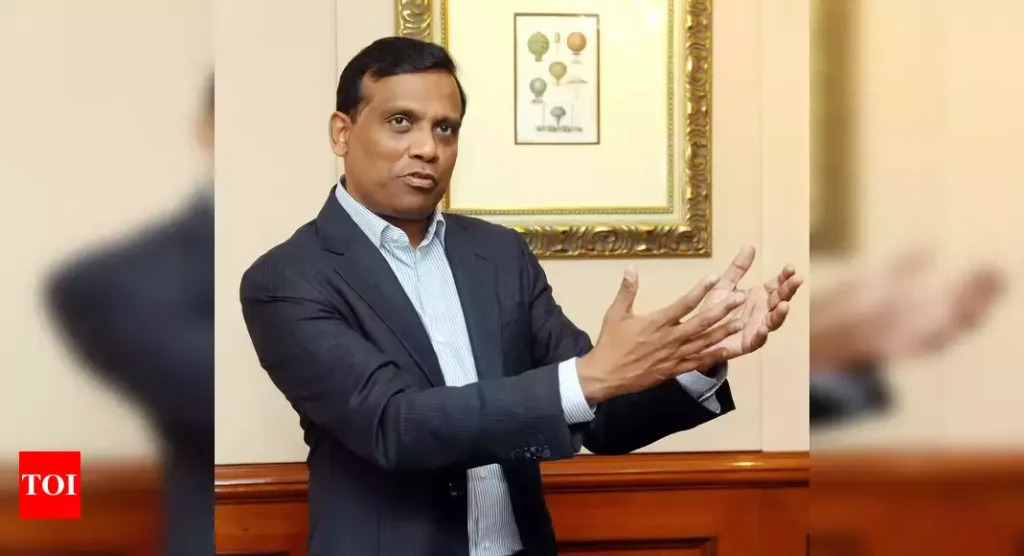A panel comprising industry leaders including Bill Winters from Standard Chartered Bank, Ravi Kumar S from Cognizant, Jenny Johnson from Franklin Templeton, and Rizwan Sajan from Danube Group, highlighted the promising trajectory of the Indian economy. They emphasized the pivotal role of technologies like artificial intelligence in driving India’s growth amidst challenging geopolitical dynamics.

During a panel discussion titled ‘Fissures, Faultlines and Future – In Search of an Equilibrium’, the speakers remarked that India has the potential to emerge as the global economic powerhouse in the upcoming decades, signaling a shift in the world’s economic landscape.
Bill Winters, CEO of Standard Chartered Bank, expressed optimism about India’s current achievements and future potential, emphasizing the need to maintain momentum. He highlighted India’s capacity for accelerated growth beyond the current 6-6.5% rate, cautioning against complacency in leveraging its opportunities.
The Indian economy is projected to expand by 7.3% in FY24, according to the latest outlook from the International Monetary Fund (IMF). While growth is expected to stabilize at around 6.5% over the next two fiscal years, the IMF highlighted India’s advantageous position in a world disrupted by technologies like artificial intelligence (AI). This advantage is attributed to India’s robust and inclusive national digital infrastructure.
“India is a data economy, with a significant amount of data in the hands of its users. This positions India to leverage artificial intelligence more effectively than many other countries. India aspires to be a creator economy and is characterized by its entrepreneurial spirit,” remarked Ravi Kumar S, CEO of Cognizant.
Jenny Johnson, president and CEO of Franklin Templeton, commended the government’s initiatives in implementing coordinated economic policies, noting their importance in driving growth. She emphasized that the last decade saw China’s dominance over India, partly due to the lack of organized economic policies in India.
“India has a tremendous opportunity ahead, and we are witnessing genuine economic optimism due to coordinated economic policies, such as the IFSC GIFT city,” highlighted Johnson. “If we liken each country to a kitchen, India stands out as having the most well-stocked kitchen for opportunity, thanks to the fundamental tailwinds driving its growth,” she added.
Rizwan Sajan, founder and chairman of Danube Group, highlighted the increasing influence of Indians globally. “Indians hold significant sway in the real estate market in Dubai, with 40% of it being dominated by individuals of Indian descent,” Sajan noted, attributing this trend to the efforts of the Indian government to strengthen ties with the UAE.
The signing of a comprehensive economic partnership agreement between India and the UAE in 2022 resulted in a notable 16% surge in bilateral trade during FY23. With ambitious goals, both countries aim to double their non-petroleum trade to $100 billion by 2030. Sajan highlighted that the strong bilateral relations are also encouraging increased UAE investment in India.
Moreover, they emphasized the importance of India implementing further reforms to solidify its position as a global player on the international stage.
The panel emphasized the necessity for India to undertake further reforms to enhance its standing as a global player. “Capital markets remain underdeveloped, the rupee lacks internationalization and isn’t a currency of trade; these are essential components for India to emerge as a prominent global financial player,” remarked Winters. He highlighted a significant opportunity for India in the coming decades, stressing the need for accelerated growth to achieve comparable per capita income levels with other economies possessing similar potential and resources.
India’s per capita income is forecasted to reach $2,850 in 2024, notably lower than China’s $13,160 and advanced economies’ $58,170, underscoring the gap that needs to be addressed for India to realize its full economic potential.



